Every time you walk through town, drive to work or pass by a shop, you’ll almost always notice some form of outdoor advertising.
It’s not just huge billboards and scaffolding banners you’ll see either. Smaller-scale adverts like signage boards, vinyl banners and printed flags are used every day by businesses to advertise their brand.
Outside marketing can be a fantastic way of grabbing the attention of potential customers and reaching the right people.
With this guide, you’ll find out more about the different types of advertising materials available and how you can creatively use them to your brand’s benefit.
What’s in this article?
- What is outdoor advertising?
- Why is outdoor advertising important?
- What ideas can make my outdoor advertising effective?
- What are the different outdoor advertising regulations?
- What outdoor advertising products can I use?
What is outdoor advertising?
Outdoor advertising is any promotions that are displayed outside and reach possible customers who pass them. They are normally posted on building walls, windows, street furniture, public transport and as standalone advertisements.
They are designed to grab the attention of people who pass them and can be used to advertise store promotions, events, business info, like opening hours and new product launches.
Notable examples include billboards, stickers, signs, banners and more.
Why is outdoor advertising important?
Outdoor advertising can be an invaluable weapon in your marketing arsenal.
It can help you reach that all-important footfall that passes through town and city centres every day. Placing adverts in places where there’s plenty of people lets you target a wider audience – meaning more potential customers.
Producing outside adverts can also complement your other marketing methods, be it printed posters, flyers or brochures. When you use them alongside each other, you can close in on the maximum number of potential customers for your business.
How effective is outdoor advertising?
A Nielsen study around outdoor advertisements, specifically posters, found that 51% of respondents had noticed an ad in the past month – 38% in the last week.
Even more impressive, is the fact that 47% of those surveyed managed to recall an ad they had seen.
Those kinds of numbers can be vital to your company, particularly if you place your promotion on a busy street, where many will walk by every day. You’ll have a much higher likelihood of people not just seeing your advert, but also retaining the message and possibly doing business with you in the future.
Are there any disadvantages of outdoor advertising?
Though we’d argue that the advantages outweigh the disadvantages, it’s important to know the limitations of advertising outdoors.
People will generally see your ads while they’re on the move, meaning you need to keep your message short to grab them while you can. There’s also the risk of waste coverage, meaning not everyone passing by your outdoor advertising banner will be a part of your target market.
Plus, you are fixed in one space with your advert, so you need to choose the correct location to display it – otherwise, you risk reaching a smaller number of people than you originally intended.
How can I make my outdoor advertising effective?
When advertising outdoors, you need to ensure your design is as eye-catching as possible, to attract the attention of people walking or travelling past. Of course, this depends on what you’re promoting.
As a rule, try to stick to these design principles:
- Think outside the box – back in 2006, McDonalds’ sundial billboard turned heads by indicating the meal to have at what time. This is just one outdoor advertising example that shows how alternative thinking can create a memorable ad.
- Tailor your design to your promotion – if you’re advertising opening hours, your customers want that information laid out, plain and simple. If it’s a sale or product launch, then something more extravagant may be needed.
- Make sure it stands out – branded benches, bus advertisements, oversized scaffolding banners – all have one thing in common, they’re instantly recognisable. Whatever your outdoor advertising idea, getting eyes on it is crucial, so always keep that fact in mind when designing.
What are the different outdoor advertising regulations?
Before you splash your advertising out in public, it’s important to know where and what you can and can’t display.
The UK Government has strict guidelines about this and has published a guide to outdoor advertisements. Within this guide, items that are classed as an advertisement are defined, this includes:
- Posters and notices
- Placards and signage boards
- Flag advertisements
- Directional signs
- Estate agent boards
- Price displays
Depending on where you display your advertisement, you may need permission from the relevant authorities.
Generally, you’ll need to follow five ‘standard conditions’ when you display an outdoor ad. They need to be:
- Kept clean and tidy.
- Maintained in a safe condition.
- Displayed with the permission of the owner of a site they are on.
- Not obscuring and transport-related signs (road, rail etc.).
- Removed carefully if the planning authority requests it.
What outdoor advertising products can I use?
Wall stickers
What are wall stickers?
Wall stickers are decals that can be placed on a shop, café, bar or restaurant wall – both outdoors and indoors.
They can be stuck to a wall using one of two ways:
- Static Wall Clings – using static energy, the sticker clings to the wall – making it easy to remove when no longer needed.
- Vinyl Wall Adhesive – Solopress wall stickers use a unique adhesive technology that leaves no residue behind when the sticker is moved.
Why use wall stickers?
They can be personalised with a printed design that suits your promotion and used on a range of surfaces. This includes plastic, brick, metal, concrete and more.
Both types of sticker are easy to apply, long-lasting and easy to remove. This means that you can reposition your wall stickers several times, if you feel they’ll work better in a different location.
Do wall stickers damage walls?
No. Thanks to state-of-the-art formulas and adhesives, you can use and remove wall stickers without causing any damage to your walls or paint.
Floor stickers
What are floor stickers?
Floor stickers are eye-catching decals that are used to direct your customers to where you want them to go when they’re outside and inside your store.
Perfect for helping people follow social distancing guidelines, they mark out where people can go and show which direction to follow – keeping customers on your premises.
Stickers can also be customised with your own custom design and messages – keeping your instructions on brand.
Why use floor stickers?
They’re a responsible way of maintaining government guidelines on customers queuing outside and walking inside your premises. Stickers also show you’re taking customer welfare seriously, good promotion in itself.
Even safety equipment gives you a chance to advertise. Floor stickers provide the ideal opportunity to customise with your brand logo and keep it at the forefront of your customers’ minds.
Are floor stickers durable?
Yes. Thanks to the sturdy, glossed material used to make them, floor stickers will last anywhere between two and five years.
Signage boards
What are signage boards?
Signage boards are durable outdoor promotional tools that are fixed and displayed onto walls or objects outside business premises. They’re a fantastic opportunity to get creative with your adverts and use colourful graphics and text to catch the eye of pedestrians.
Solopress offer four different sign types:
- Correx – made from corrugated plastic for short-term promotions.
- Foamex – ideal, lightweight canvases for nailing onto surfaces.
- Dibond – made from aluminium and plastic, for long-lasting sturdiness.
- Bollard Covers – place over bollards outside of your store.
Why use signage boards?
Because they’re made from sturdy materials, they can withstand the elements outside – much more than paper-based marketing. This makes them a worthwhile investment, as they can remain in place and looking good for a longer time.
Plus, they give you a little more space to play with when creating your artwork. Extra room means more information and imagery can be added to design an eye-catching outdoor ad.
How effective are signage boards?
Signage boards are incredibly effective, with stats indicating brand awareness increasing by 47.7%. More visibility and recognition of your brand could lead to extra business.
Vinyl banners
What are vinyl banners?
Vinyl banners are large-size material displays that are durable enough to withstand harsh weathers when displayed outside.
Banners can be made of:
- PVC – lightweight, non-perforated banners that is resistant to fading from UV light.
- Mesh – banners with small perforations, which allow wind to travel through – leaving it less susceptible to damage outdoors.
While there are also unique café barriers, which display a banner attached between two aluminium posts – frequently seen outside coffee shops.
Why use vinyl banners?
Whether you need them for a short-term promotion or something more permanent, vinyl banners are easy to store away for whenever you need it next. They’re also lightweight, robust and long-lasting, giving you a strong return on your initial investment.
Plus, they’re instantly recognisable and fantastic at capturing the attention of those passing your premises.
How do you hang a vinyl banner?
Our vinyl banners are attached to a surface using string, cable ties or tension hooks. This is threaded through reinforced metal eyelets on the banners themselves, letting you secure to a window or outside wall.
Window stickers
What are window stickers?
Window stickers are decals that are designed to stick to the inside of a window, displaying an advertisement on the outside to those passing by.
They’re designed to grab your customers attention, before they even walk into to your premises.
These clings and stickers can be easily applied onto glass surfaces, without leaving any residue when they are moved – making them easy to apply and remove.
Why use window stickers?
Businesses typically use them to display:
- Opening hours
- Directions
- Sales and discount info
Window stickers are particularly effective when they’re attached to door windows, or right next to them – at the eye level of people walking in. That way, information about your brand is quite literally in their eye line, increasing their chances of taking in your message.
Do vinyl stickers easily stick to glass?
Thanks to the high-gloss smooth surface, you’ll have no problem applying your vinyl window stickers with complete ease.
A-boards
What are A-boards?
A-boards are a free-standing, double-sided form of frame used for displaying posters and other artwork on pavements and outside shops.
They’re often found outside cafes and restaurants to display menus, literally stopping potential customers in their tracks to check out what they have to offer.
They are also commonly used to advertise a sale of promotion, tempting people into a store to see what bargains there are to be found.
Why use A-boards?
This lightweight and weatherproof solution can be folded flat to be stored overnight, and are simple to take out and set up in no time the next morning.
At Solopress, we offer three A-board sizes:
What are A-boards also known as?
A-boards are also referred to as A-frames, pavement signs and sandwich boards. Instead of including a poster, some versions will instead feature a blackboard ready to be written on in chalk, often with a wooden frame rather than metal.
Snap frames
What are snap frames?
Snap frames are aluminium casings that a poster can be clipped into to secure it behind a plastic film – making it suitable for outdoor display and protecting against the elements.
They’re typically fixed to outside walls and are typically used for store opening hours, event promotions or sales and discount information.
Frames are also safer on surfaces, as you won’t have to pin them into the wall or risk any left-behind sticky residue once you take it down.
Why use snap frames?
Frames are resistant to rain, so they offer a long-lasting solution that’ll ensure the poster inside isn’t damaged by the weather.
At Solopress, we offer four frame sizes:
How do you use snap frames?
Snap frames are incredibly easy to use for outdoor advertising. The edges of the snap frame come with a tensioned hinge, that snaps into position when pushed down. If you need to replace the inner design, all you have to do is lift the edges with your fingers.
Printed flags
What are printed flags?
Printed flags are outdoor fabric displays that can be attached to a pole and displayed outside stores or at public events and exhibitions. They’re held down using a solid base or ground spike and can be customised with your branding.
At Solopress and printed in several different shapes, including:
While there are also Mistral flags that can be attached to lampposts, Street flags that can be fixed to a backpack and worn by promotional workers and Wind Dancer flags for extra sturdiness in bad weathers.
Why use printed flags?
They’re typically used to promote events or have standing proudly at the entrance of your premises. Pedestrians will instantly see them and hopefully retain any message that you print on them.
Printed flags are also machine washable and easy to iron, so they’re a long-term marketing investment if you’re planning on displaying the same promotion for a while.
What is the difference between a banner and a printed flag?
Unlike an outdoor advertising banner, a printed flag hangs freely from its edge, meaning it will attractively flutter in the wind to better catch the attention of passers-by.
Ready to take your advertisements into the great outdoors? We can get you started. Visit our homepage and check out our entire range of outdoor advertising products.
Choose the one that suits your promotion and we’ll handle the printing and super-fast delivery.



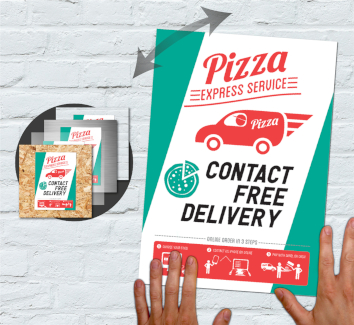
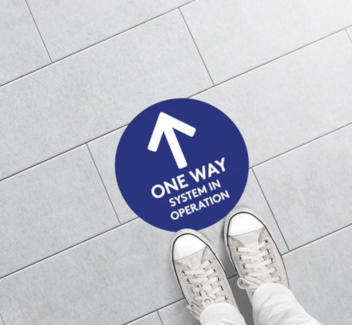
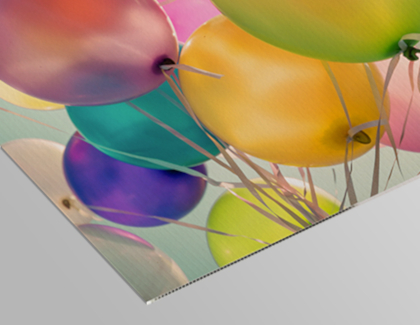
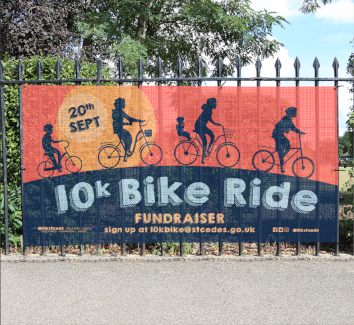
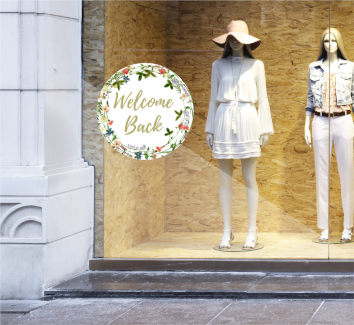
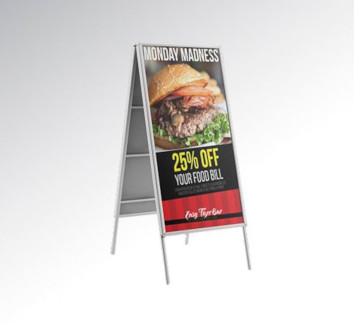
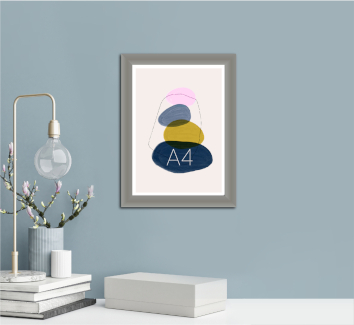
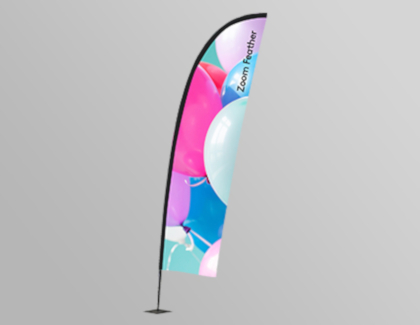



Really useful blog piece. Thanks for this. I trust you won’t mind if I do share this with on our social media platforms (with due credits, of course). I am a customer and already subscribed to your mailing list.
Of course! Glad you found it useful.
Comments are closed.